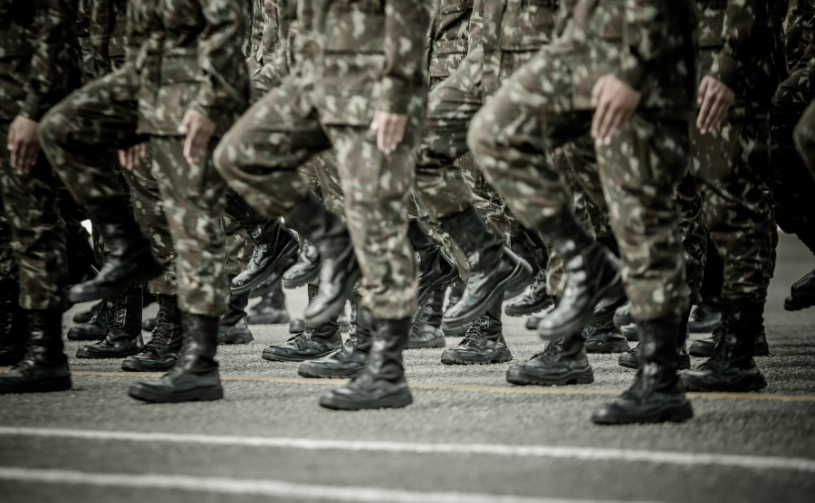This article is the last in a series leading up to Memorial Day, seeking to highlight the contributions of Black Americans to US military engagement in the Indo-Pacific region and how these experiences shaped their life in the region and at home. This article discuses Black American experiences during the Vietnam War, which commemorates its 50th anniversary this year.

[Image: US Soldiers Source: EWC]
The Vietnam War was a time of significant racial tension and injustice for Black American soldiers in the US military. Their growing opposition to the war and their continued struggle for equality became intertwined, leading to both a growing sense of racial solidarity with the Vietnamese people and an increase in activism at home.
Black Americans certainly had good reasons to oppose the war in Vietnam. From the outset, the burden of the war was borne disproportionately by Black Americans and poor white Americans. During the early years of the war, college students could defer from military service. This was beneficial for richer young men, who could afford to go to university. In 1967, 64% of all eligible Black American men were drafted, but only 31% of eligible white men – a clear indicator of how rules were designed for the benefit of one racial group over another.
Black Americans were also underrepresented in the officer corps, making up less than 2% of officer-ranked servicemen in 1962, and just 2.3% ten years later in 1972. It is also important to acknowledge the fact that Black Americans represented 10.6% of the entire military between 1961-1966 with 12.6% in the Army, 5.4% in the Navy, 10.3% in the Air Force and 8% in the Marines.
Historic disparities in education resulted in many Black Americans scoring lower on military entrance examinations, making them ineligible for some of the more technical military specialties. An interview of Black American soldiers in Vietnam in 1968 found that around 80-85% of them expressed negative feelings about the war and the military’s treatment of Black Americans.
Black Americans also faced disproportionate punishment during the Vietnam War, with a 1972 Department of Defense study, cited by the New York Times, finding that they received 25.5% of nonjudicial punishments and 34.3% of court-martial punishments. They were also overrepresented in military prisons, such as Long Binh Jail where they made up 58% of prisoners in 1969.
In 1971, less than honorable discharges were issued to one of every seven Black servicemen compared to only one of every fourteen white servicemen. Additionally, they were more likely to be assigned to combat units and killed in Vietnam, with 16.3% of draftees and 23% of combat troops being Black American despite making up only 11% of the civilian population. In 1965, Black Americans accounted for almost a quarter of all combat deaths.
As a result, the armed forces faced widespread resistance and unrest from Black servicemen. The teachings of Malcolm X and his critique of the war had an influence on several major bases. Andrew Pulley, a leader of “GIs United Against the War” at Fort Jackson, South Carolina, reports that he and other soldiers were initiated into the movement by listening to tapes of Malcolm X in their military barracks.
Malcolm X was the first prominent Black American leader to denounce the Vietnam War, and Black progressives in electoral politics began to speak out in opposition to the war as it progressed. Many Black Americans developed a sense of racial solidarity with the Vietnamese, as Black activists increasingly charged that the war itself was a form of racism.
After Martin Luther King Jr.’s assassination, racial tensions increased during the Vietnam War, especially on rear-line military bases. One prominent example was rioting at Long Binh Jail, with thousands of other reported incidents between 1968 and 1971. Journalists noted large-scale battles and daily racial incidents at China Beach and in Danang clubs and dining halls. Time Magazine’s Wallace Terry reported in 1969 that there was “another war being fought in Vietnam—between Black and white Americans,” with racial incidents becoming commonplace across multiple military installations.
Amid racial tensions on bases between Black and white Americans, some Black American soldiers resonated strongly with Vietnamese people. For instance, James Daly, a Black American marine who served in the Vietnam War, spoke about the relationship between Black American soldiers and Vietnamese citizens in his documentary, No Vietnamese Ever Called Me a N****r.
According to this documentary, friendly Vietnamese citizens understood that white soldiers were far more likely to use slurs against them, while many Black American soldiers wouldn't call Vietnamese citizens slurs because of their own experiences with racism. “The Vietnamese perception that both Vietnamese and Black Americans were victims of white racism led them to empathize with Black soldiers,” said Daly. He also recalled that Vietnamese civilians were friendly with him, and that they shared a special bond due to facing similar hardships and struggles.
This article was co-written by Spring 2023 East-West Center in Washington Young Professionals Bobby Kincaid and Van Tran.
Bobby Kincaid is a research intern at the East-West Center in Washington. He is a recent graduate from American University with a major in international relations with a focus on China and Taiwan.
Van Tran is a senior undergraduate student majoring in International Studies at Rhodes College, with a concentration in Asian Studies, immigration, democracy & governance.